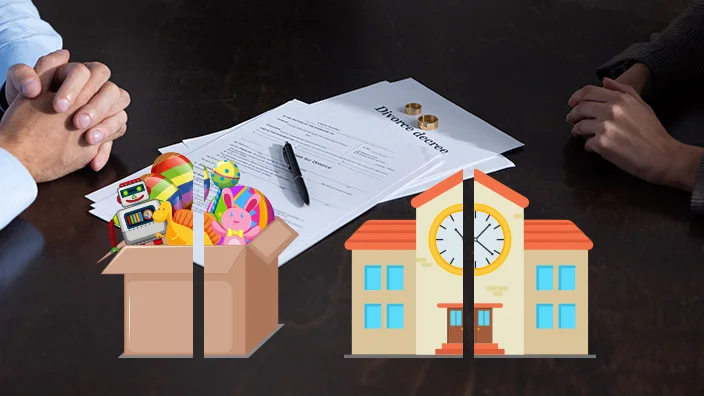After marriage, if a person wants to end the marriage and want to get out of it, the question arises, then, is that “how does marital property get divided in a divorce?”
Though divorce laws vary from state to state, yet for fair distribution of assets, you need some good advocacy from family law firms. However, the query In divorce how are assets divided? has gained popularity.
The study is about assets division in divorce and how the money, property, debts, and other things are divided. The article also addresses the issue of fair division and inequitable division according to state laws and courts.
Table of Contents
- Definition of Marital Property
- Marital Property Vs Separate Property
- Keeping Assets Separate in Marriage
- How are Marital Assets Divided?
- Engage an Attorney for Settlement
- Fair Division of Marital Property
- Separate Debts or Marital Debts
- Dividing Assets in Community Property States
- The Inequitable Distribution of Assets
- Division of Property & Debts- State Laws
- Agreement of Mediation
- Marital Asset Division by Court Order
- Documents Needed for Property Transfer
- Understanding an Equalization Payment?
- House Division in Divorce
- Conclusion
- Frequently Asked Questions
Definition of Marital Property
Marital property is defined as “all assets acquired during the marriage and before separation.” Marital assets also include debt that is also subject to division.
Generally, the accumulation of wealth and assets via marital relationships is subject to equitable division. So, financial obligations like debts are considered to be communal responsibilities.
 Joint property is divided by numerous couples via dialogue, mutual understanding, and negotiation without court intervention. However, if there is disagreement between the spouses then it becomes necessary for the court to intervene.
Joint property is divided by numerous couples via dialogue, mutual understanding, and negotiation without court intervention. However, if there is disagreement between the spouses then it becomes necessary for the court to intervene.
North Carolina’s “Equitable Distribution of Marital Assets” statutes give the court the power to distribute the property between the marital parties.
This must include debt if there is any. Nonetheless, the right to equitable distribution isn’t automatic but must be claimed by any of the parties.
Marital Property Vs Separate Property
Some state laws make a distinction between marital and separate other property by dividing the property of the marriage or dividing your property while divorcing and allowing the respective spouses to keep their separate property.
Generally, marital property includes any prenuptial agreement of the assets like a marital home, pension money and gold while the rest is kept as a separate property.
Example of separate property includes the premarital property of a spouse, inherited property, gifts to one spouse, etc.
Unluckily, the difference between separate and marital property becomes complicated when the spouses mix both separate and marital funds in a joint bank account or by using a joint account during the marriage period.
However, this distinction isn’t working in some states as in those states laws allow the judges to include both couple’s property and debts during division of assets.
Keeping Assets Separate in Marriage
Some of the couples separate their assets throughout the marriage like they have their separate houses, bank accounts, and the rest. This is not a common thing but it simplifies the divorce papers process.
As mentioned foregoing, usually do go for the division of personal property- refers to the non-marital property owned by one spouse.
Other assets “bequeathed to one spouse over the other” comprise “injury award received by that partner, spouse’s pension earned before the marriage.”
 Further, “presents an inheritance offered especially to that partner, business owned privately, while none of the spouse operating it, and any residential or commercial property separately acquired by a spouse” are the additional assets that can be kept separate in marriage.
Further, “presents an inheritance offered especially to that partner, business owned privately, while none of the spouse operating it, and any residential or commercial property separately acquired by a spouse” are the additional assets that can be kept separate in marriage.
However, if the spouses used a variety of funds in purchasing and maintaining the commercial property with a mix of community funds, it would be considered marital property.
The court will split the marital property on the principle of distribution of equity, which is not always 50-50 but depends on the economic distribution of the spouses.
How are Marital Assets Divided?
If you are in a marriage with your partner then your marital assets include things like a bank account, real estate, and other investments you both have carried out during the marital period. So, these assets are assumed by the court as jointly owned assets.
Here, in the post-divorce property division process, the court uses the “property equitable distribution concept” to give each spouse a percentage of the property, rather than offering it to only one spouse.
Thus, both partners will get their possessions worth their portion.
Engage an Attorney for Settlement
Some spouses develop consent on the property division of assets and do not turn toward courts. However, it’s not the same in every case.
The divorce process becomes emotionally draining process when the partners standoff for financial gains.
 In the standoff scenario, you can protect yourself by equipping yourself with as much financial information as possible.
In the standoff scenario, you can protect yourself by equipping yourself with as much financial information as possible.
In such a scenario where the distribution of marital assets is a nightmare, your divorce attorney can be an effective link in discovering your spouse’s assets.
Fair Division of Marital Property
If you are turning to the court for assets division after a standoff with your spouse, under Michigan law the judges will mostly divide your property fairly, which means both partners get half of everything.
However, in some cases, the judge believes in dividing marital property in various ways.
Separate Debts or Marital Debts
The fair division of debt is sort of different from the division of assets. Marital debt is divided fairly if both spouses get responsible for a “fair share of marital debt.”
However, before marriage, the debt acquired by one partner isn’t marital.
 On the other hand, irrespective of the purchase or credit card debt use, debt acquired during the marriage is marital debt.
On the other hand, irrespective of the purchase or credit card debt use, debt acquired during the marriage is marital debt.
However, exceptions are there to this rule in the form of gambling debt, debt acquired for the restitution of criminal cases, and money spent on extramarital affairs. These do not come under the ambit of marital debts.
Dividing Assets in Community Property States
Nine states in the US. are, “Arizona, California, Idaho, Louisiana, Nevada, New Mexico, Texas, Washington, and Wisconsin” use “community property rules” for determining ownership.
The laws of these states have assumed that community property should be divided into necessarily equal pies between the partners provided that both partners share joint debt ownership.
However, in the recent trend, states, like Arizona and Texas, are avoiding the “equal division requirement.”
The Inequitable Distribution of Assets
Factors that the court considers the inequitable distribution of assets include “income debt, prior marital support obligations, property of each spouse, duration of the marriage, age, and health of each partner and retirement benefits and pension”.
The court can order an injunction until equitable distribution state, preservation, transfer, and deletion of assets are preserved.
Division of Property & Debts- State Laws
If you have developed sufficient understanding with your partner regarding the division of assets, keep in mind that you should not ignore the basic legal rules of property division.
 These rules will steer court decisions in the background if your negotiation or property settlement was not successful with your spouse.
These rules will steer court decisions in the background if your negotiation or property settlement was not successful with your spouse.
So, although, the rules of assets division in divorce vary from state to state as it is based on state laws, the general principles and rules are similar across the United States.
Agreement of Mediation
Mediation is a process in which “a neutral person helps you and your spouse to settle the issue you do not agree on in your divorce case.”
Mediation pushes you to settle the issue without the intervention of the court and the coercion of external apparatus.
However, mediation and the sort of alternatives in case of resolution of disputes are detested, especially, those involving domestic violence like fear, threats, etc.
Relevant Read: Legal Separation In California
Marital Asset Division by Court Order
When failed to reach an agreement after negotiating the settlement of how to divide the property fairly, the judge decides for you while considering some factors.
 Judges keep in mind factors like the tenure of the marriage, the spouse contributed to the marital estate, the financial need of both spouses, money earned by each party, the reason for divorce while calculating the fault of a partner, and anything that the judge considers worth counting.
Judges keep in mind factors like the tenure of the marriage, the spouse contributed to the marital estate, the financial need of both spouses, money earned by each party, the reason for divorce while calculating the fault of a partner, and anything that the judge considers worth counting.
Documents Needed for Property Transfer
Though your “Judgment of Divorce” will give an award of some property to both parties, you will require some extra legal documents to put an impact on the transfer of property.
For instance, a pension or retirement account can only be split by a special order called a “QDRO (Qualified Domestic Relations Order) or an EDRO (Eligible Domestic Relations Order).” You might require an attorney to make a draft of QDRO or EDRO for you.
If the “Judgment awards real property (a house, building, or land) that one spouse acquired and the deed is in both your names or only in the name of the spouse not keeping the property,” you may require a quitclaim deed.
If the Judgment awards a property, say a bike, to one spouse and the bike is titled in both your names or only in the name of the spouse not caring for the bike, then you can transfer the bike’s title.
Understanding an Equalization Payment?
When we speak about assets division in divorce, it doesn’t refer to splitting each property between the spouses.
Usually, it means that the judges bestow each spouse with a percentage of the total fair market value of the “marital or estate community” or also refers to a couple’s marital property minus debts.
The judge, then, divides the assets and distributes the material debts between both spouses to assign both spouses their share of the assigned estate.
 Partners, usually, go through the same process while working on the assets or property settlement agreement.
Partners, usually, go through the same process while working on the assets or property settlement agreement.
What if there is one property, like a house or retirement plan, far more valuable asset than the rest of the assets? What will happen when the assets can’t balance each other?
One of the most important suggested solutions is the equalization of payment to the other spouse.
It is important to note that the equalization payment can either be on the side of the paying partner or spouse’s separate property or from the marital property or both.
Now, if that particular spouse doesn’t have sufficient cash to cover the equalization payment, the judge might order the payment in future installments.
House Division in Divorce
Unlike the other assets in the divorce decree, your house is the most crucial considered material property because of the emotional connection of the children which makes it a herculean task for the spouse in terms of property division.
The division of the house is not just a matter of who gets the house but more than that. It is also related to the compensation of the other spouse for its share of equity and the process of moving out or not during the divorce agreement.
Family house division decision is also closely linked to other issues like “child primary physical custody and alimony.”
Rest of the options include buying out your spouse by refinancing the mortgage payments of loans and making the property in your name- selling a house and deferred sale by continuing to co-own the house for a specific period, if possible.
One spouse, having the custody of children, might stay in family businesses for the stability of the children with the other. They can also stay if the “current real estate market” is weak.
Conclusion
Divorce is a gruesome process when a layer of assets division is added to it. Divorce becomes a nightmare for some couples when they are unable to settle their divorce by themselves.
However, courts are there to decide for them and divide the assets when the spouses are unable to settle.
In divorce how are assets divided? The court after counting on numerous factors like marital and personal property, debts, etc. decides the division of assets. The laws for the division of assets in divorce vary from state to state.
Joint property, assets, debts, etc. are divided by numerous couples via dialogue, mutual understanding, and negotiation without court intervention.
However, if there is a disagreement between the spouses then it becomes necessary for the court to intervene.
Frequently Asked Questions
Why moving out is the biggest mistake in a divorce?
When you move out and leave the house before getting the divorce, you increase the expectation of your spouse that he or she will get the house in marital assets.
How do you calculate assets in a divorce?
Assets are calculated by adding the total value of the assets owned jointly by both spouses minus the debt owned by both spouses jointly in addition to your superannuation account.
How do you split finances when divorcing?
If your assets were separated before divorce, you can easily split your finances. However, if you are holding assets jointly, then settle things either mutually or go to court.
How is the house split in a divorce?
It is related to the compensation of the other spouse for its share of equity and the process of moving out or not during the divorce proceedings.


















